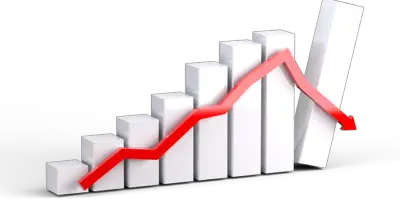What is the Definition of a Market?

The definition of a Market is a place where buyers and sellers interact to exchange goods and services. It is a mechanism that enables the transfer of ownership of goods and services from one person to another. Markets can be physical or virtual, and they can exist in many forms, including supermarkets, auctions, online marketplaces, and stock exchanges.
How Does it Work?
The workings of a market depend on several factors, including the number of buyers and sellers, the availability of information, the quality of goods and services, and the presence of regulations. In general, markets work by matching buyers and sellers and facilitating the exchange of goods and services for a price.
The most basic form of a market is a bilateral exchange between two parties. For example, if you want to buy a book from a seller, you would agree on a price, and the seller would give you the book in exchange for the money. This exchange is based on the principle of supply and demand. If the seller has many books and few buyers, the price will be low, and if there are many buyers and few books, the price will be high.
In more complex markets, such as the stock market, buyers and sellers do not interact directly but instead use intermediaries such as brokers to facilitate the exchange. In these markets, prices are determined by supply and demand, but also by factors such as company performance, economic indicators, and geopolitical events.
History of Markets
The concept of a market has been around for centuries, and its history can be traced back to ancient civilizations. The idea of a market is essentially a place where people can come together to buy and sell goods, services, and resources.
The earliest known markets were in Mesopotamia and Egypt, where people would gather to trade goods such as grain, spices, and textiles. The ancient Greeks and Romans also had marketplaces, which were centers of commerce and cultural exchange.
During the Middle Ages
Markets became more organized and specialized. Towns and cities across Europe developed markets where traders could sell their wares. These markets were often held in public squares and were important centers of commerce and social activity.
In the 17th and 18th Centuries
Markets began to expand beyond local and regional levels. Global trade routes were established, and markets grew to become international in scope. The development of trading companies, such as the Dutch East India Company and the British East India Company, helped to facilitate global trade and establish new markets.
The Industrial Revolution in the 19th Century
Significant changes to the nature of markets. Mass production and improvements in transportation and communication led to the development of new markets and the growth of existing ones. The rise of large corporations and the growth of financial markets also transformed the way markets operated.
In the 20th century
The development of technology and the growth of the global economy further transformed markets. The advent of the Internet and e-commerce have created new opportunities for businesses to reach customers and expand their markets.
Today
Markets continue to play a vital role in the global economy. They serve as a means for individuals and businesses to buy and sell goods and services, allocate resources, create wealth, and generate employment opportunities. The evolution of markets over time has reflected changes in technology, politics, and culture, and they will continue to evolve as the world changes.
Types of Markets
Markets can be classified in different ways based on their characteristics, participants, location, and the types of products or services being exchanged. Understanding the different types of markets can help individuals and businesses to identify opportunities and make informed decisions when buying or selling goods and services. Here are some of the most common types of markets:
- Physical Markets Physical markets are traditional markets where buyers and sellers meet in a physical location to exchange goods and services. Examples of physical markets include farmer’s markets, flea markets, and stock markets.
- Virtual Markets Virtual markets are online marketplaces where buyers and sellers can meet and exchange goods and services. Examples of virtual markets include eBay, Amazon, and Etsy.
- Financial Markets Financial markets are markets where financial instruments such as stocks, bonds, currencies, and derivatives are traded. Examples of financial markets include stock exchanges, bond markets, and foreign exchange markets.
- Consumer Markets Consumer markets are markets where individuals buy goods and services for their personal use. Examples of consumer markets include grocery stores, clothing stores, and restaurants.
- Business Markets Business markets are markets where businesses buy goods and services to use in their operations. Examples of business markets include suppliers of raw materials and equipment.
- Commodity Markets Commodity markets are markets where raw materials or primary products such as oil, gold, wheat, and corn are traded. These markets can be physical or virtual.
- Auction Markets Auction markets are markets where goods or services are sold to the highest bidder. Auction markets can be physical or virtual, and they can be used to sell a wide range of products, including art, real estate, and antiques.
- Monopoly Markets Monopoly markets are markets where a single supplier or producer controls the supply of a product or service. In such markets, prices are typically higher than in competitive markets, and there is little incentive for the supplier to innovate or improve quality.
- Oligopoly Markets Oligopoly markets are markets where a small number of large companies control the supply of a product or service. In such markets, there is a degree of competition, but prices may still be higher than in competitive markets.
- Perfect Competition Markets Perfect competition markets are markets where there are many buyers and sellers of a product or service, and no one supplier or buyer has control over the market. In such markets, prices are typically set by supply and demand, and there is a strong incentive for businesses to innovate and improve quality.
Why Is It So Important?
Markets play a crucial role in our economy and society. They provide a mechanism for the efficient allocation of resources, facilitate trade and commerce, and promote innovation and growth. Without markets, it would be difficult to coordinate economic activity and allocate resources efficiently.
One of the most important functions of markets is to determine prices. Prices are a signal that communicates information about the value of goods and services. When prices are high, it signals that the demand for a particular product is high, and resources should be allocated to produce more of it. When prices are low, it signals that the demand is low, and resources should be allocated to other products.
Markets also provide an incentive for innovation and growth. Businesses that can provide better products or services at a lower cost can attract more customers and increase their market share. This competition encourages businesses to invest in research and development, improve efficiency, and reduce costs.
In addition, markets promote trade and commerce. They provide a mechanism for buyers and sellers to find each other and exchange goods and services. This enables businesses to specialize in producing certain products or services and trade with others who specialize in different products or services. This specialization and trade increase efficiency and enable businesses to achieve economies of scale, which can lead to lower costs and higher profits.
Conclusion
Now knowing what the definition of a market is, and how they work. The functioning of markets are essential for the efficient allocation of resources, promoting innovation and growth, and facilitating trade and commerce. Without markets, it would be difficult to coordinate economic activity and allocate resources efficiently. Therefore, it is crucial to understand the role of markets in our economy and society.


